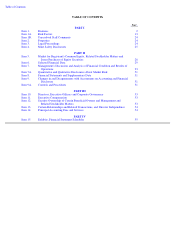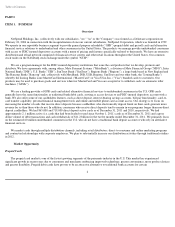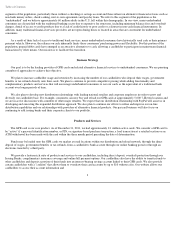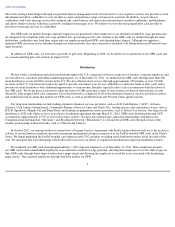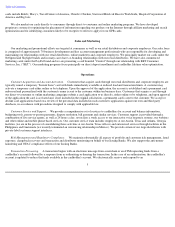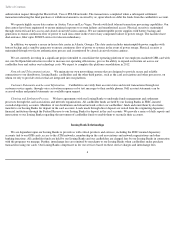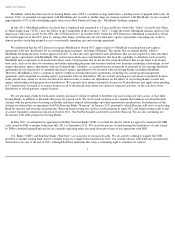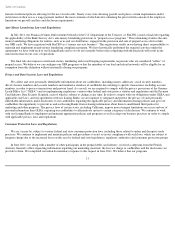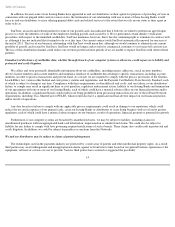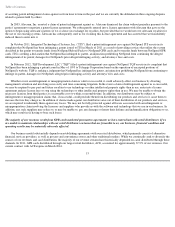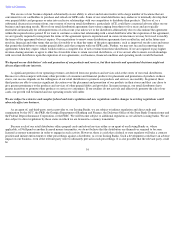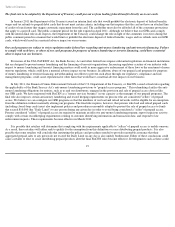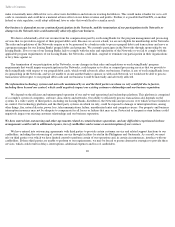NetSpend 2011 Annual Report Download - page 14
Download and view the complete annual report
Please find page 14 of the 2011 NetSpend annual report below. You can navigate through the pages in the report by either clicking on the pages listed below, or by using the keyword search tool below to find specific information within the annual report.
Table of Contents
In 2010, the FRB issued a final rule implementing Title IV of the Credit Card Accountability, Responsibility, and Disclosure Act of 2009,
or CARD Act, which imposes requirements relating to disclosures, fees and expiration dates that are generally applicable to gift certificates,
store gift cards and general-use prepaid cards. We believe that our GPR cards, and the maintenance fees charged on our GPR cards, are exempt
from the requirements of this rule, as they fall within an express exclusion for cards which are reloadable and not marketed or labeled as a gift
card or gift certificate. However, this exclusion is not available if the issuer, the retailer selling the card to a consumer or the program manager
promotes, even if occasionally, the use of the card as a gift card or gift certificate. As a result, we provide retailers with instructions and
policies regarding the display and promotion of our GPR cards so that retailers do not place our GPR cards on a display that does not separate
or otherwise distinguish our GPR cards from gift cards.
Money Transmitter and Payment Instrument Laws and Regulations
Nearly every state regulates the business of money transmitters. While a large number of states expressly exempt banks and their agents
from such regulation, others purport to regulate the money transmittal business of banks and their agents to the extent not conducted through
bank branches. Historically, we have taken the position that state money transmitter statutes do not generally apply to our business because,
among other reasons, we do not receive or handle any consumer funds related to our cards at any time. Instead, our distributors collect all
consumer funds related to the sale or load of our prepaid debit cards and remit them by electronic transfer directly to our Issuing Banks. In
addition, we and our distributors acted as the agents of nationally chartered banks that were exempt from state regulation in the past. We are
actively pursuing our own money transmitter licenses in the jurisdictions where we do not currently have them in order to reduce our
dependence on the ability of our Issuing Banks to enter into agency relationships with proposed new distributors. We currently have money
transmitter licenses in 30 jurisdictions and applications pending in 17 jurisdictions. Our goal is to acquire licenses in all of the jurisdictions
where our current or expected activities, or the activities of our distributors or reload partners, require licenses.
In those states where we are licensed as a money transmitter, we are subject to direct supervision and regulation by the relevant state
banking departments or similar agencies charged with enforcement of the money transmitter statutes and we must comply with various
requirements, such as those related to the maintenance of a certain level of net worth, surety bonding, selection and oversight of our authorized
agents, maintaining permissible investments in an amount equal to our outstanding payment obligations, recordkeeping and reporting and
disclosures to consumers. We are also subject to periodic examinations by the relevant licensing authorities, which may include reviews of our
compliance practices, policies and procedures, financial position and related records, various agreements that we have with our Issuing Banks,
distributors and other third parties, privacy and data security policies and procedures and other matters related to our business.
We understand that state banking departments, which are charged with regulating the business of money transmission, have traditionally
taken the position that the offering of payroll cards does not constitute money transmission and so we believe that we are not required to obtain
state money transmission licenses in order to engage in this activity.
State Wage Payment Laws and Regulations
The use of payroll card programs as means for an employer to remit wages or other compensation to its employees or independent
contractors is governed by state labor laws related to wage payments. Our payroll distribution service includes payroll cards and convenience
checks, and is designed to allow employers to comply with such applicable state wage and hour laws. Most states permit the use of payroll
cards as a method of paying wages to employees, either through statutory provisions allowing such use, or, in the absence of specific statutory
guidance, the adoption by state labor departments of
10


